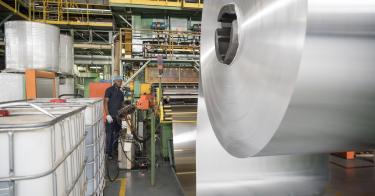Just weeks after the United States-Mexico-Canada Agreement went into effect, President Donald Trump fired a shot across Canada's bow by reimposing 10% tariffs on certain primary aluminum imports.
These tariffs mean that the price of goods made from aluminum (tables, chairs, lamps, etc.) will go up for American families. The action is also a signal to American businesses that the administration will still impose new taxes on them—currently in the form of tariffs—despite the economic slowdown caused by the pandemic.
To understand why these new tariffs are being imposed, it helps to look back to when the Trump administration first began imposing tariffs on aluminum imports.
In 2018, an investigation by the Department of Commerce found that aluminum imports threatened to impair U.S. national security. President Trump then chose to impose tariffs of 10% on aluminum from all countries, even imports from our allies.
When tariffs were applied in March of that year, certain trading partners were given the opportunity to negotiate "deals" with the administration to avoid tariffs. Meanwhile, Americans were paying more for aluminum, and several countries implemented retaliatory tariffs. Canada hit $16.6 billion worth of products from the U.S. with tariffs, a move that had long-term negative impacts on U.S. exports of the targeted goods.
USMCA negotiations were ongoing as this tit-for-tat exchange took place, and Canada managed to receive an exemption from aluminum tariffs. In May 2019 an agreement was signed in which Canada agreed to an aluminum import monitoring system with the U.S. This meant that if the U.S. determined that aluminum imports from Canada "increased substantially," they could reimpose tariffs.
So why have certain Canadian imports been hit with new 10% tariffs? Because the administration determined that they were major contributors to a 27% increase in aluminum imports from Canada between June 2019 and May 2020. This is not a measure of annual imports, but rather a snapshot of trade volumes mid-year.
The spike of aluminum imports from Canada is not nearly as extreme as the administration portrays. Americans will source roughly 14% of aluminum imports from their northern neighbor this year, only 2% above the average annual amount imported from Canada between 2015 and 2017.
The Trump administration's action of imposing aluminum tariffs on Canada is a major misstep.
First and foremost, the administration's new tariffs actually hurt the aluminum industry. The Aluminum Association—whose members produce roughly 70% of aluminum traded in North America—argue that the tariffs "(make) U.S. aluminum companies less competitive when trying to sell their goods to industrial customers across North America."
With tariffs on nearly every other country, a 2% increase in supply from one of the few countries with more competitively priced aluminum should be expected. The existing aluminum tariffs have already cost Americans $2.2 billion, and importers naturally want to avoid adding to that bill.
The increasing cost of aluminum tariffs will start growing faster now that some imports from Canada are subject to them. This could translate to even higher prices for everything from pickup trucks to canned fruits and vegetables.
Budgets are already tight for millions of Americans during the pandemic. Higher prices on the most basic goods hurt families, especially lower-income families that spend a larger portion of their income on food.
Canada is also set to retaliate with tariffs on an estimated $2.7 billion worth of U.S. products made from aluminum, including washers and bicycles. American businesses that export these products could see long-term damage to their ability to sell abroad as a result.
Refueling a trade dispute with Canada is not in the interest of American families or businesses. Tariffs on aluminum from Canada were damaging to American businesses in 2018 and could be even more harmful to the U.S. economy during the pandemic.
Rather than increasing the cost to trade with Canada—or any country—the Trump administration should be promoting pro-growth strategies, which include lowering tariffs.
This piece originally appeared in The Sacramento Bee



